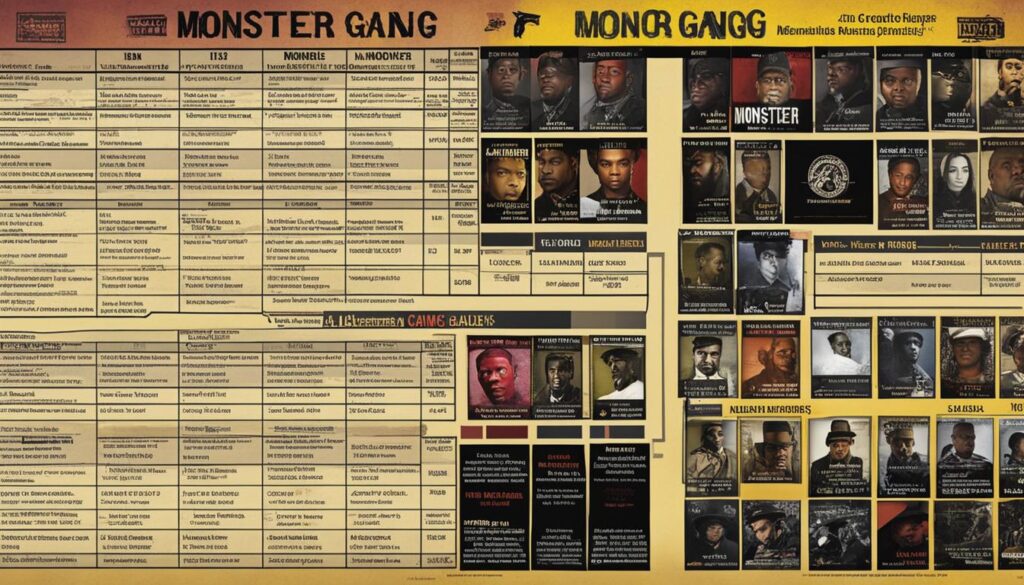The audiobook review of “Monster: The Autobiography of an L.A. Gang Member” by Sanyika Shakur provides a gripping and thought-provoking account of life in the L.A. gang underworld. Shakur’s firsthand experiences shine light on the harsh realities of gang activities, making for an emotional and confronting journey.
Through this highly acclaimed work, Shakur shares his life story as a former member of the notorious L.A. gang, the Eight Trays Gangsters. With raw honesty and vivid detail, Shakur takes us on a journey through the dangerous streets of California, revealing the inner workings of gang culture and the impact it has on individuals and communities.
This audiobook review explores the various themes, characters, and literary elements that make “Monster” a standout work in its genre, highlighting its cultural significance and potential for education and social awareness.
Overview of “Monster: The Autobiography of an L.A. Gang Member”
“Monster: The Autobiography of an L.A. Gang Member,” written by Sanyika Shakur, details his real-life experiences of being a member of the Crips, one of the most notorious street gangs in Los Angeles. The memoir is a raw, unfiltered account of Shakur’s journey through the gang underworld, highlighting his struggles with addiction, violence, and the pursuit of power.
The book describes Shakur’s early days on the streets and his eventual rise to becoming a respected member of the gang. However, as he delves deeper into the violent world of gang culture, he begins to question its morality and his role within it. The memoir also depicts his subsequent attempts at redemption and his eventual departure from the gang lifestyle.
“Monster” is one of the most candid and revealing gang autobiographies to date, offering a unique window into the dark and dangerous reality of gang life in Los Angeles. Through Shakur’s first-hand account, readers gain insight into the complex web of relationships, power dynamics, and violence that define gang culture in America. With vivid prose and raw honesty, Shakur takes readers on a gripping and emotional journey they won’t soon forget.
Character Analysis
Throughout “Monster: The Autobiography of an L.A. Gang Member,” author Sanyika Shakur serves not only as the protagonist but also our guide through the dangerous and often conflicted world of LA gang culture. Shakur’s candid reflections provide readers with a fascinating insight into his experiences, thoughts, and emotions, allowing us to empathize and connect with the protagonist on a very intimate level.
On the one hand, Shakur is portrayed as a flawed and complex individual, struggling with his own sense of personal identity, motives, and desires. On the other hand, he is intensely loyal to his gang, taking on a position of leadership and responsibility within its ranks, while fiercely rejecting mainstream society and its values.
Throughout the audiobook, Shakur provides detailed portraits of other key players who cross his path, allowing us to understand their motivations and perspectives. These supporting characters range from fellow gang members, such as his best friend Rat and mentor Monster, to his family members, including his mother and grandmother. Each character is carefully crafted and serves a specific purpose within the story, providing unique insights into the harsh realities and complexities of gang life.
Setting and Atmosphere
Through vivid description, “Monster: The Autobiography of an L.A. Gang Member” creates a realistic portrayal of the intense and unforgiving atmosphere of L.A. gang culture. The author, Sanyika Shakur, immerses the reader in the urban environment, bringing to life the harsh realities and challenges faced by those caught up in gang activity.
The gritty and raw nature of the setting creates a powerful backdrop for Shakur’s story. The city is depicted as a place of violence, danger, and unpredictability, where survival is often dependent on one’s ability to navigate complex gang dynamics and maintain a sense of streetwise toughness. The pervasive sense of fear and unease is felt throughout the narrative, heightening the stakes and underscoring the seriousness of life on the fringes of society.
Urban Decay and Despair
The urban environment takes on a life of its own in “Monster,” as Shakur explores the darker corners of the city and the toll that poverty, drugs, and systemic neglect have taken on its residents. The descriptions of run-down buildings, trash-strewn streets, and vacant lots echo the sense of decay and despair that infects the surrounding communities. Shakur’s use of language and imagery is particularly effective in conveying the stark reality of life in this environment, and the hopelessness that can come with it.
Gang Mentality and Identity
Another central aspect of the book’s atmosphere is the pervasive sense of gang culture and the importance of identity within it. The author explores the complex dynamics at play within gang hierarchies, and the sense of belonging and purpose that can come with being a part of a gang. He also touches on the ways in which gang membership can be used as a means of escape from otherwise difficult or unrewarding circumstances, highlighting the complex interplay between individual choice and systemic oppression.
All in all, the atmosphere created in “Monster: The Autobiography of an L.A. Gang Member” is both gripping and confronting, painting a vivid picture of the harsh realities of gang life in Los Angeles.
Narrative Style
Sanyika Shakur’s “Monster: The Autobiography of an L.A. Gang Member” offers readers a first-person perspective on life in the gang underworld, portrayed through the author’s unique and vivid narrative style. Shakur’s writing style is compelling, drawing readers in with his use of descriptive language and compelling personal reflections.
Through his storytelling technique, Shakur paints a dark and gritty picture of the L.A. gang scene, immersing readers in the dangers and complexities of this world. His use of dialogue, flashbacks, and internal monologues adds depth and authenticity to the narrative, bringing the characters and events to life.
One of the most notable aspects of Shakur’s narrative style is his candid approach to sharing his experiences. He does not shy away from difficult topics or uncomfortable truths, portraying his fellow gang members and rivals with honesty and humanity. Through his storytelling, Shakur offers readers a powerful and thought-provoking examination of human nature and the impact of societal forces on individual lives.
The use of first-person perspective
Shakur’s use of the first-person perspective is an effective choice, immersing readers in his experiences and creating a sense of immediacy that draws them into the story. This intimate perspective allows for a deeper understanding of the protagonist’s motivations and emotions, resulting in a more impactful reading experience.
Themes and Motifs
“Monster: The Autobiography of an L.A. Gang Member” by Sanyika Shakur portrays various themes and motifs, delving deep into the life of the author and the gang culture he was a part of. Gang culture is the central theme of the memoir, depicting how it shapes the personality and behavior of individuals involved in it. The book highlights the cycle of violence that comes with this subculture, and how it’s almost impossible to break free from it.
Through his narrative, Sanyika Shakur explores the concept of redemption and how it can be achieved, despite the challenges that come with it. The search for redemption is depicted as a struggle that requires a lot of resilience and willpower. The book also examines personal identity, especially in the context of gang culture, and how it can be altered or even lost to fulfill the expectations of the group.
The effects of violence and aggression are also significant motifs in the book. Sanyika Shakur explores how violence can be an inevitable result of being part of a street gang and how it can impact individuals’ lives in the long term.
Overall, “Monster: The Autobiography of an L.A. Gang Member” is a raw and candid depiction of the gang culture in Los Angeles, exploring significant themes and motifs that have a profound impact on society and culture.
Emotional Impact
Listening to “Monster: The Autobiography of an L.A. Gang Member” is a gripping, emotional journey that confronts the harsh realities of gang life in Los Angeles. Sanyika Shakur’s personal account of his experiences is powerful and thought-provoking, evoking strong emotions in listeners.
The audiobook provides an introspective experience, forcing listeners to confront the uncomfortable truths of gang culture and the devastating impact it can have on individuals and communities. The vivid descriptions and raw honesty of the author create a deeply immersive atmosphere that is both captivating and confronting.
The emotional impact of “Monster: The Autobiography of an L.A. Gang Member” is not just limited to personal reflection, but also for cultivating empathy towards those affected by gang culture. It encourages listeners to take a deeper look at the societal issues that contribute to gang violence, confront their own prejudices, and think about the ways in which they can help create positive change.
Overall, “Monster: The Autobiography of an L.A. Gang Member” is not just a story; it is a powerful tool for raising awareness about the confronting realities of gang culture and the emotions that come with it.
Audiobook Narration
The narration of Monster: The Autobiography of an L.A. Gang Member is a standout feature of the audiobook. The narrator adopts a style that matches the tone of the narrative, bringing Shakur’s memoir to life with conviction and authenticity. The voice acting is exceptional and compelling, and the narrator’s ability to convey the emotions of the story delivers an immersive listening experience.
The audio production quality is excellent, with clear sound quality that makes for a seamless listening experience. The pacing is well-managed, and the narrator’s diction is easy to follow. Moreover, the narrator manages to convey the author’s experiences and emotions with sensitivity, without losing the gritty perspective of the story.
The narration style is personal, emotive, and reflective, which suits the first-person perspective of the audiobook. The narrator’s use of inflection and tone helps the listener to connect with Shakur’s character, as well as other supporting individuals portrayed in the audiobook. Overall, the audiobook narration is a standout feature that elevates the listening experience.
Pacing and Plot Development
One of the strengths of “Monster: The Autobiography of an L.A. Gang Member” is its carefully crafted plot, which balances slower character-driven moments with more action-packed sequences, creating a sense of suspense throughout the story. Sanyika Shakur’s first-person perspective provides valuable insight into the plot progression, allowing readers to gain a deeper understanding of the events that led him to become involved in the gang lifestyle.
The pacing of the audiobook is also expertly crafted, with each scene building upon the last and leading the story towards its natural conclusion. Shakur’s use of vivid descriptions and personal reflections deepen the emotional impact of the plot development, immersing readers in the harsh realities of the L.A. gang scene and showcasing the struggles and challenges he faced during his time in the gang.
Overall, the audiobook’s pacing and plot development are well-crafted, providing readers with a compelling narrative that takes them on a gripping and emotional journey.
Cultural and Social Commentary
The audiobook “Monster: The Autobiography of an L.A. Gang Member” is more than a personal reflection on the life of Sanyika Shakur. It also serves as a cultural and social commentary, addressing issues that extend beyond Shakur’s personal experiences.
One of the central social issues addressed in the audiobook is the dynamics of gang culture. Shakur provides an intimate look at the inner workings of gang life and the complex web of relationships that exist within this subculture.
Racial tensions are also a significant theme throughout the audiobook. Shakur provides a raw, unfiltered portrayal of the realities of race relations within the context of L.A. gang culture.
Overall, “Monster” serves as a commentary on some of the most pressing social issues of our time, highlighting the importance of addressing the underlying factors that contribute to gang violence and racial tensions.

Literary Significance
The impact of Sanyika Shakur’s “Monster: The Autobiography of an L.A. Gang Member” on the genre of autobiographical literature is undeniable. The audiobook provides a gripping and thought-provoking perspective on the realities of gang life, highlighted by Shakur’s powerful and evocative writing style. Through his use of descriptive language and his unique storytelling approach, Shakur brings to life the harsh realities of urban life and sheds light on the complex dynamics of gang culture.
The critical reception of “Monster” has also been overwhelmingly positive, with many literary circles praising the book’s ability to confront tough issues and shine a light on important social problems. Shakur’s writing has been compared to that of other notable literary figures, such as James Baldwin and Richard Wright, with many seeing “Monster” as a significant contribution to the canon of African American literature.
Literary Analysis
Shakur’s powerful use of language and imagery throughout “Monster” adds a layer of depth and complexity to the audiobook. The raw emotion and honesty with which he tells his story not only captivates listeners but also offers a unique insight into the complexities of gang life and the broader issues facing urban communities.
The audiobook’s exploration of themes such as identity, violence, and redemption also reveals the depth of Shakur’s literary analysis and his ability to tackle complex issues head-on. His use of first-person perspective and vivid descriptions helps create a riveting and authentic listening experience that is both captivating and emotionally impactful.
Impact on the Genre
“Monster” has had a significant impact on the genre of autobiographical literature, with many subsequently published books drawing inspiration from Shakur’s unique perspective and writing style. His willingness to confront tough issues and explore complex themes has paved the way for other authors to delve deeper into the realities of gang culture and life in urban communities.
Critical Reception
| Source | Rating |
|---|---|
| Publishers Weekly | Starred Review |
| The New York Times | Positive Review |
| The Guardian | Positive Review |
The critical reception of “Monster” has been overwhelmingly positive, with many praising Shakur’s ability to capture the complexity and rawness of his experiences. The audiobook has been noted for its gripping style and unique perspective, with many readers finding it to be an important and enlightening read.
Real-Life Relevance
“Monster: The Autobiography of an L.A. Gang Member” provides readers with an authentic account of life in the gang-ridden streets of Los Angeles. This audiobook offers a window into the harsh realities of street life and the socio-economic factors that contribute to gang violence in urban environments. Sanyika Shakur’s personal experiences shed light on the challenges faced by those living in underserved communities, highlighting the systemic issues that perpetuate the cycle of poverty, crime, and violence. Shakur’s story serves as a cautionary tale, urging us to confront uncomfortable truths about our society and take action to address these issues. “Monster” is not just an audiobook – it’s a powerful call to action and a reminder that we all have a part to play in building safer, more equitable communities for everyone.
Gang Violence and Socio-Economic Factors
Gang violence is a pervasive problem in many urban environments, particularly those marked by poverty, high unemployment, and limited access to educational and career opportunities. “Monster” offers a unique perspective on the complexities of gang culture, delving into the underlying social and economic factors that drive young people to join gangs and participate in criminal activities. Through Shakur’s narrative, we gain a better understanding of the sense of community and belonging that gangs offer, as well as the dangers and pitfalls that come with this lifestyle. This audiobook serves as a reminder that we must address the root causes of gang violence and work to support at-risk youth before they become involved in criminal activities.
Insights into Street Life
For many people, the world of gangs and street crime is largely invisible, something that only exists in movies and TV shows. “Monster” provides an eye-opening look at the realities of life for those living in gang-controlled neighborhoods, where violence and danger are a constant presence. Shakur’s firsthand accounts provide an intimate and personal look at what it’s like to grow up in these environments, highlighting the unique challenges faced by those living in poverty and struggling to survive. The audiobook offers a valuable perspective on the impact of community and the importance of relationships in surviving and overcoming life’s challenges.
Comparison with Similar Works
As a gang memoir and work of autobiographical literature, “Monster” is part of a broader genre that includes many related audiobooks. While each work in this genre is unique and valuable in its own right, “Monster” stands out for its vivid and immersive portrayal of life in the L.A. gang underworld.
Compared to other gang memoirs, such as “Pimp” by Iceberg Slim and “The Autobiography of Malcolm X,” “Monster” offers a more in-depth look at the social and cultural underpinnings of gang violence and the complex factors that contribute to its perpetuation.

“Monster” also differs from other works of autobiographical literature, such as “The Glass Castle” by Jeannette Walls and “Angela’s Ashes” by Frank McCourt. Rather than focusing on the author’s upbringing and personal struggles, “Monster” emphasizes the external forces and social dynamics that shape the protagonist’s experiences.
Overall, “Monster” holds a unique and important place in the genre of gang memoirs and autobiographical literature. Its raw and honest portrayal of life in the L.A. gang scene is a powerful and thought-provoking contribution to the ongoing conversation surrounding these critical issues.
Audience Reception
Since its publication, “Monster: The Autobiography of an L.A. Gang Member” has garnered significant attention from readers, academics, and critics alike. The audiobook has received numerous reviews on popular platforms such as Goodreads and Amazon, with many readers praising Sanyika Shakur’s candid and unflinching portrayal of life in the gang underworld.
One reviewer on Goodreads writes, “This book should be required reading for anyone who wants to understand the realities of gang life. Sanyika Shakur’s story is both heartbreaking and inspiring, offering a firsthand account of the struggles and challenges faced by those growing up in impoverished urban environments.”
The audiobook’s cultural impact has also been recognized by scholars and educators, with many incorporating it into their curricula and using it as a tool to raise awareness about social issues and gang dynamics. The story’s profound exploration of identity, violence, and redemption has resonated with audiences around the world, making it a standout work in the genre of autobiographical literature.
Overall, “Monster: The Autobiography of an L.A. Gang Member” has received overwhelmingly positive feedback, with its ability to confront difficult realities and offer a gripping emotional journey making it a must-read for anyone interested in exploring the complexities of the gang underworld.
Impact on Society and Education
The audiobook of “Monster: The Autobiography of an L.A. Gang Member” has great potential educational value, particularly for students studying social issues and urban culture. By portraying the harsh realities of gang life and its impact on individuals and communities, the book can help raise social awareness and broaden perspectives.
Furthermore, the audiobook’s focus on personal narratives and first-hand experiences can provide valuable insights for students exploring issues related to identity, redemption, and the search for meaning.
Inclusion of “Monster” in educational curricula can help foster critical thinking, encourage discussion and debate, and promote empathy and understanding among students. As such, it is worth considering its inclusion in relevant courses, particularly those covering topics in sociology, criminal justice, or ethnic studies.
Conclusion
Overall, “Monster: The Autobiography of an L.A. Gang Member” by Sanyika Shakur is a powerful and gripping audiobook that provides a thought-provoking, introspective look into the harsh realities and challenges of gang life in Los Angeles.
Shakur’s first-hand account of his experiences and his engaging narrative style make for a compelling listening experience. The audiobook’s exploration of themes such as gang culture, violence, redemption, and identity, offers a significant amount of substance and relevance to today’s society.
The audiobook’s cultural and social commentary provides valuable insights for those seeking to gain a deeper understanding of the dynamics of gang culture, as well as the socio-economic factors that contribute to it. The emotional impact of the story is undeniable, remaining with listeners long after they have finished listening.
Overall, “Monster” is highly recommended for those interested in autobiographical literature, gang memoirs, and anyone seeking to gain a deeper understanding of the realities of street life in inner-city America. Its literary significance and cultural impact make it a valuable addition to any educational curriculum.



